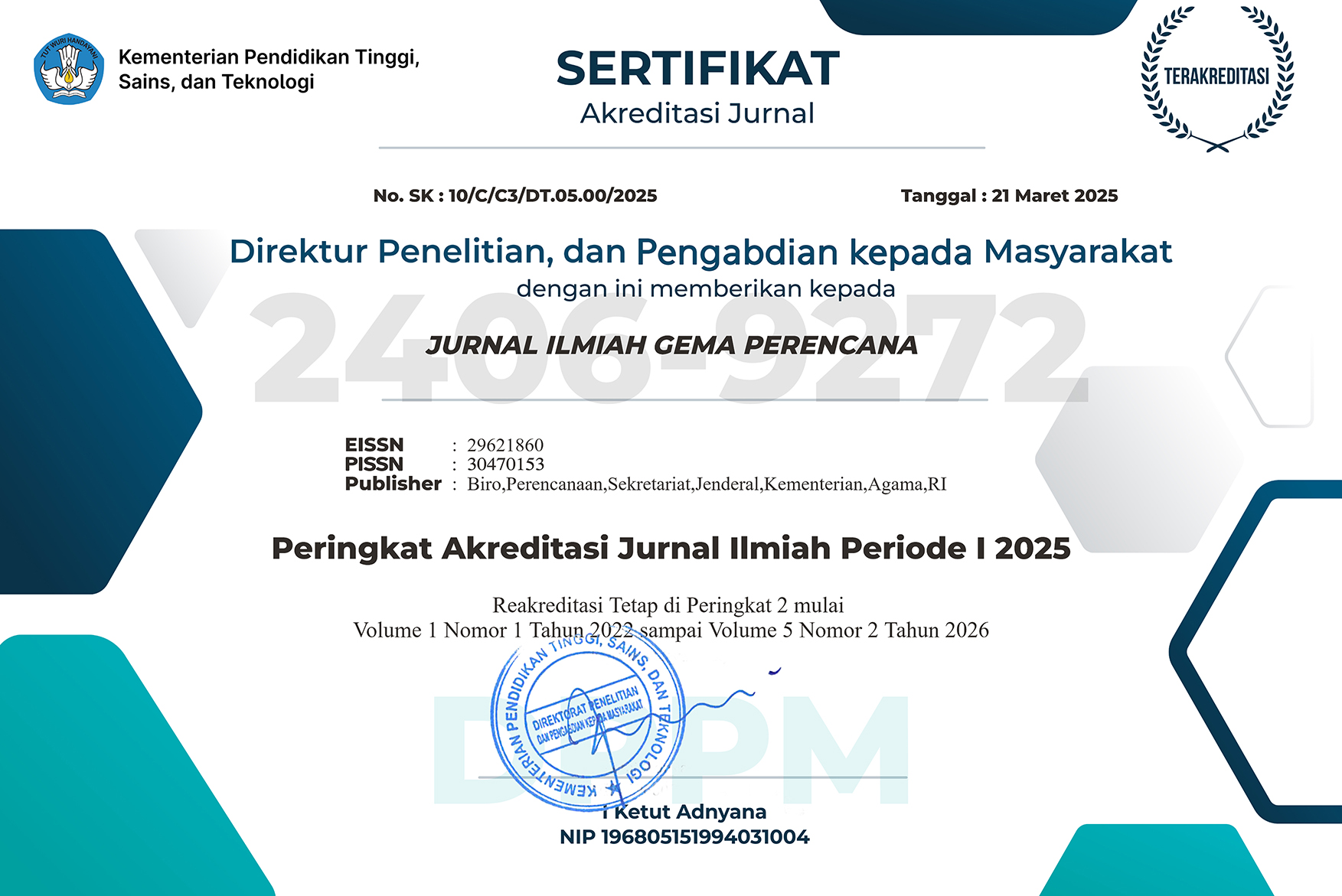Development Strategy of the Spice Route in the West-South Region of Aceh as a Halal Tourism Destination: A SWOT Analysis
DOI:
https://doi.org/10.61860/jigp.v4i2.295Abstract
The Spice Route should serve as the main driver for developing tourism based on history, culture, and economy in Aceh, particularly in the West-South region. However, this area still faces limitations in infrastructure, a lack of digital promotion, and suboptimal management of its historical and cultural potential. This study aims to formulate strategies for developing the Spice Route in the West-South region of Aceh as a halal tourism destination, focusing on enhancing competitiveness, sustainability, and community empowerment. This article employs a descriptive qualitative approach, collecting data through document studies, non-participant observation, and semi-structured interviews with traditional leaders, policymakers, academics, and communities across five districts in the region. SWOT analysis was used to map the strengths, weaknesses, opportunities, and threats of the area’s development. The study recommends strengthening the branding of the Spice Route, revitalizing historical sites, improving infrastructure, and fostering Penta Helix collaboration to position the area as a center of history-based halal tourism.
Downloads
References
Abdul, Budiman, J., & Adrial. (2024). Muslim Millennial Traveler ‘DNA’ dan Persaingan Wisata Halal di Dunia. Biznesa Economika : Economic and Business Journal, 1(01), 37–57. https://doi.org/10.2024/1KS8BK61
Ardiwidjaja, R. (2024). Pelestarian Tinggalan Budaya Bawah Air: Pemanfaatan Kapal Karam Sebagai Daya Tarik Wisata Selam. AMERTA, 35(2 SE-Articles), 133–148. https://ejournal.brin.go.id/amerta/article/view/3430
Azizah, R. R., Jayadi, A., Fitriani, F., Dirda, J. E., Lestari, I., Rahmadani, S., Masyhuri, Z. A., Susilayanti, T., Ningrat, M. D., & Hartanto, A. P. (2024). Exploration of Coffee Garden Educational Tourism Potential: Sustainable Development in Rempek Darussalam Village. Jurnal Wicara Desa, 2(4), 261–265. https://doi.org/10.29303/WICARA.V2I4.5511
Azmi, K. (2022). Implementation of Qanun Number 8 of 2013 in Halal Tourism Management From Sadd Al-Zari’ah Perspective: A Case Study in Lhoknga District. IJoMaFiM: Indonesian Journal of Maqasid and Fiqh Muqaran, 1(1), 84–99. https://doi.org/10.22373/IJOMAFIM.V1I1.2720
Bibin, M., & Ardian, A. (2020). Strategi Pengembangan Kawasan Wisata Pantai Songka di Kota Palopo. EDUTOURISM Journal Of Tourism Research, 2(01), 72–78. https://doi.org/10.53050/EJTR.V2I01.131
Carter, C. (2013). The Age of Strategy: Strategy, Organizations and Society. Business History, 55(7), 1047–1057. https://doi.org/10.1080/00076791.2013.838030/ASSET//CMS/ASSET/EB72305F-5C60-4545-AE1E-8E368EC8C3AA/00076791.2013.838030.FP.PNG
Farjoun, M. (2002). Towards an organic perspective on strategy. Strategic Management Journal, 23(7), 561–594. https://doi.org/10.1002/SMJ.239
Fuertes, G., Alfaro, M., Vargas, M., Gutierrez, S., Ternero, R., & Sabattin, J. (2020). Conceptual Framework for the Strategic Management: A Literature Review—Descriptive. Journal of Engineering, 2020(1), 6253013. https://doi.org/10.1155/2020/6253013
Gardjito, M., Santoso, U., & Utami, N. N. (2018). Ragam Kuliner Aceh: Nikmat Yang Sulit Dianggap Remeh. UGM PRESS.
Hamid, A. R. (2022). Jalur Rempah dan Islamisasi Nusantara: Jaringan Samudera Pasai abad XIII – XVI. Jurnal Masyarakat Dan Budaya, 23(3 SE-Articles), 269–282. https://doi.org/10.14203/jmb.v23i3.1065
Hing, L. K. (1995). The Sultanate of Aceh: Relations with the British, 1760-1824. Oxford University Press. https://cir.nii.ac.jp/crid/1970867909767497259
Husna, A., & Fahrimal, Y. (2024). Natural Heritage for Us: Sebuah Strategi Destination Branding Pariwisata Pasca Bencana Kabupaten Aceh Jaya. SOURCE : Jurnal Ilmu Komunikasi, 10(2), 97–120. https://doi.org/10.35308/SOURCE.V10I2.10354
Inayatillah, Rahmawati, P., Ramli, Kurniawan, A., Hamsa, A., Wahyunita, W., & Azizah. (2023). Sosialisasi Potensi Jalur Rempah di Barat Selatan Aceh. MEUSEURAYA - Jurnal Pengabdian Masyarakat, 2(2), 118–128. https://doi.org/10.47498/MEUSEURAYA.V2I2.2265
Inayatillah, Rahmawati, P., Suryadi, Ramli, Al Fairusy, M., Taran, J. P., & Kurniawan, A. (2024). The Strategic Role of Islamic Kingdoms in Aceh in the 18th and 19th Centuries: The Case of Trade in Kuala Batee and Trumon. Journal of Al-Tamaddun, 19(1), 311–334. https://doi.org/10.22452/JAT.VOL19NO1.22
Junaedi, I. W. R., SE, M. A., Waruwu, D., Ichsan, S. S., Damayana, I. W., & Th, S. (2020). Meugoe (Mengembalikan kemandirian dan kejayaan ekonomi Aceh). Penerbit CV. Sarnu Untung.
Kumoratih, D. (2022). Reconstructing Identity through Spice Route Narrative: An Urgency for Nation Branding? Journal of Visual Art and Design, 14(1), 49–65. https://doi.org/10.5614/J.VAD.2022.14.1.5
MA, M. (2024). Kontestasi Kuasa dalam Perdagangan Rempah di Pantai Barat dan Selatan Aceh Abad Ke 18 Hingga 19 M. Paradigma: Jurnal Kajian Budaya, 14, 77–89. https://doi.org/10.17510/paradigma.v14i1.1421
Moufakkir, O., Reisinger, Y., & Alsaleh, D. (2018). Much Ado about Halal Tourism: Religion, Religiosity or None of the Above? (pp. 319–329).
Muhajarah, K., & Hakim, L. (2021). Promoting Halal Tourism: Penggunaan Digital Marketing Communication dalam Pengembangan Destinasi Wisata Masjid. Al-Muttaqin : Jurnal Studi, Sosial, Dan Ekonomi, 2(1), 34–42. https://doi.org/10.63230/ALMUTTAQIN.V2I1.26
Muis, M. (2020). Perkembangan Peluang dan Tantangan Wisata Halal di Aceh. Jurnal Adabiya, 22(1), 41–55. https://doi.org/10.22373/ADABIYA.V22I1.7456
Rahmi, A. N. (2020). Perkembangan Pariwisata Halal dan Pengaruhnya terhadap Pertumbuhan Ekonomi Indonesia. ISLAMICONOMIC: Jurnal Ekonomi Islam, 11(1), 2020. https://doi.org/10.32678/IJEI.V11I1.226
Rizkwanti, R. A. K. D., & Kurniawan, A. R. (2025). Integrated Rural Development: Sebuah Tinjauan Literatur Sistematis di Indonesia. Jurnal Ilmiah Administrasi Publik, 11(1), 1–12. https://doi.org/10.21776/UB.JIAP.2025.011.01.1
Rustam, D., Putri, W., & Islamiah, N. (2025). Peran Wisata Halal dalam Meningkatkan Ekonomi Lokal dan Usaha Mikro, Kecil, dan Menengah (UMKM) di Nusa Tenggara Barat. Journal of Economics Development Research, 1(2), 73–81. https://doi.org/10.71094/JOEDER.V1I2.117
Sari, Y., Ridwansyah, R., & Anggraeni, E. (2024). Analisis SWOT Pengembangan Wisata Halal dalam Meningkatkan Pertumbuhan Ekonomi di Daerah Lampung. Jurnal Ilmiah Manajemen, Ekonomi, & Akuntansi (MEA), 8(1), 290–304. https://doi.org/10.31955/MEA.V8I1.3673
Sugiyono, P. D. (2017). Metode penelitian bisnis: pendekatan kuantitatif, kualitatif, kombinasi, dan R&D. Penerbit CV. Alfabeta: Bandung, 225(87), 48–61.
Suroyo, Maulana, B., & Ibrahim, B. (2021). The Development of Senapelan City as a Historical Tourism on Spice Road. Santhet (Jurnal Sejarah Pendidikan Dan Humaniora), 5(2), 147–155. https://doi.org/10.36526/SANTHET.V5I2.1472
Suryandari, N., Nurul Rahmawati, F., & Adhi Dharma, F. (2024). Madura dan Potensi Wisata Rempah: Kajian Strategi Komunikasi Pemasaran Pariwisata. Jurnal Riset Komunikasi (JURKOM), 7(2), 293–306. https://doi.org/10.38194/JURKOM.V7I2.1025
Usman, A. R. (2003). Sejarah Peradaban Aceh Suatu Analisis Interaksionis, Integrasi dan Konflik. Yayasan Pustaka Obor Indonesia.
Vargas-Sánchez, A., Hariani, D., & Wijayanti, A. (2020). Perceptions of Halal Tourism in Indonesia: Mental Constructs and Level of Support. 8, 37.
Yuliaty, T. (2020). Model Wisata Halal Sustainable di Indonesia. Universitas Islam Negeri Sumatera Utara.
Downloads
Published
How to Cite
Issue
Section
License
Copyright (c) 2025 Inayatillah, Junaidi, Fadhlur Rahman Armi

This work is licensed under a Creative Commons Attribution 4.0 International License.








